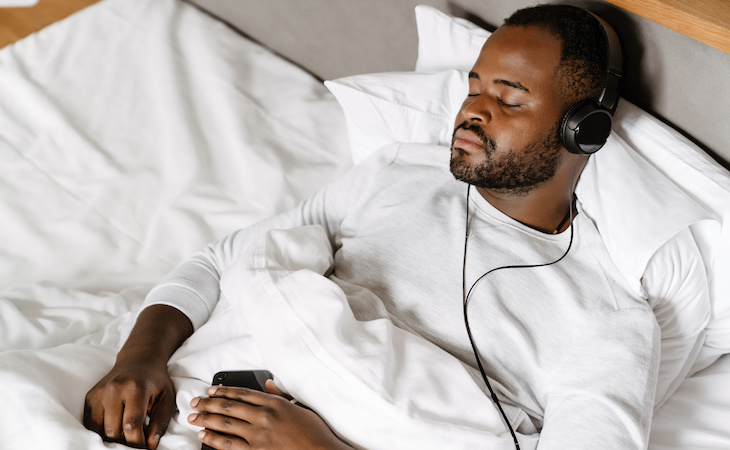Have you ever put on your favorite song when you were in a bad mood and instantly felt your energy shift? Music is a powerful tool that can affect your mood—and it turns out the right music can also relax you so you can sleep more easily.
If you’re looking to add a soundtrack to your bedtime routine, then playing lo-fi music is trending as a way to actually help lull you into sleep.
Not convinced? We tapped professional musician, licensed therapist, and founder of Mind Noise, Daniel Rinaldi, to learn the science behind lo-fi music for sleep.
What is lo-fi music?
The term “lo-fi” is short for low fidelity—aka “low quality.” Lo-fi music is a genre of music that’s “intentionally rough, unpolished, and has imperfect sound production elements,” explains Rinaldi. He says you can often find simple melodies, repetitive loops, and minimalistic arrangements in this genre.
“Lo-fi music has gained popularity as a soothing and atmospheric background for activities like studying, relaxing, or creating ambiance,” he adds. “This genre has recently gained more popularity as the digital age is in full effect.”
History of lo-fi music
The term “lo-fi music” gained popularity in the 1950s, when recording technology began to be available to mass markets. The low-quality of the equipment stuck in the recordings, and a natural distorted type of sound was present in the tracks.
When the 1960s came around, bands like the Beach Boys began using lo-fi sounds in their recordings on purpose. The 1980s hip-hop rise saw even more of this purposeful sound recording, and its influence is still found in alt genres today.
Can lo-fi music help you relax?
Studies have shown that listening to lo-fi music can help relax both the mind and body to help usher in sleep. The repetitiveness in the sounds and laidback melodies and rhythms can help the body enter a more chill state.
“Lo-fi music has moderate tempo and a mellowness,” explains Rinaldi. “Slow music with a steady beat can help slow down the heart rate and induce a state of relaxation. Lo-fi music’s repetitiveness can help mask intrusive thoughts which can create a sense of calm.”
Essentially, it creates a sort of meditative state for the listener.
How to listen to lo-fi music for better sleep
If you want to try listening to lo-fi music for better sleep at home, Rinaldi recommends one of his favorite playlists.
“People can utilize lo-fi music at home to increase better sleep by creating a calming environment, looking for curated playlists specifically for sleep improvement, developing a bedtime routine that includes your playlist, and using lo-fi music in combination without bedtime routines to create more of an experience,” says Rinaldi.
FAQs
What does lo-fi mean in music?
Lo-fi stands for low fidelity, which essentially means “low quality.” Distorted sounds, haziness, or fuzziness in music are all part of the lo-fi genre. These sounds appeared automatically in the 1950s and ’60s, due to the low quality of recording equipment that was available at the time. But today, this type of sound is intentionally used to create a new genre of music.
Why is lo-fi music so relaxing?
Because lo-fi music has such a repetitive quality, it can help usher the listener into a meditative state. Plus, it’s “mostly utilized as background music,” says Rinaldi. This can help subconsciously distract the listener from whatever stressors or mental thoughts are getting in their way of relaxation.
Is lo-fi music healthy?
Studies have shown that lo-fi music can help the human brain relax and unwind, whether it’s for studying or sleeping purposes.
“Lo-fi music can have other health benefits too,” adds Rinaldi. “For example, stress reduction, improved focus and concentration, enhanced moods, increased mindfulness, decreased insomnia symptoms, and decreased fatigue due to better sleep.”
If you have trouble sleeping and need an auditory element to your nighttime routine, trying out a lo-fi playlist every night instead of turning on your favorite re-watch show can help tell your body and mind that it’s time to relax and usher in sleep.
Music can help kids get better sleep too. Here’s how to use music to help your child snooze.




